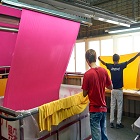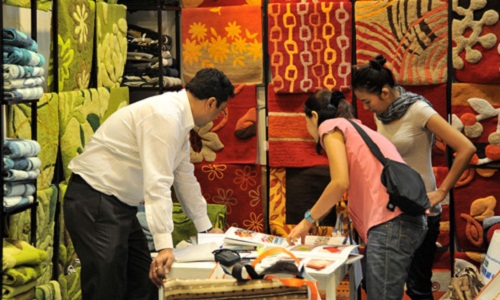FW
Readymade Garment (RMG) manufacturers have called upon the government to reduce gas prices and resolve gas and electricity supply problems to help the industry attain $50 billion export target by 2021. They made the call at the inaugural ceremony of the two-day Denimsandjeans.com Bangladesh Expo held in Dhaka at Radisson Blu yesterday.
The sixth edition of Denimsandjeans.com Bangladesh show began with the aim of sharing information about the latest fashion trends in denim products and bridging a relation between buyers and manufacturers. The exhibition provides a platform for the global denim manufacturers, buyers and retailers to assemble with the objective to share, interact and establish business ties with the suppliers of Bangladesh.
Some 28 companies from across the world participated in the expo with their latest trendy denim fashion products. Bangladeshi participants at the expo have shown strength of denim industry which is growing at a fast pace with innovation and quality products and also with on-time delivery.
The booming denim industry has great potential, the market of which is expected to reach $64.1 billion by 2021. Bangladesh has become the key manufacturing and sourcing hub among Asian countries. Nurturing this hope, the show has come into being and it would help bring global denim buyers land here. The show ends today.
Steven Rendle will be the next CEO of VF Corporation and will take over next year. He succeeds Eric Wiseman, who has been CEO since 2008. Rendle has more than 30 years of experience in the specialty outdoor and action sports industry, 16 of which have been with VF Corp. He has overseen all of VF’s divisions at one point or another.
VF includes brands like The North Face, Timberland and Vans. Shares of VF Corporation have surged about 180 per cent under Wiseman’s steady hand, as he has spurred a consistent stream of product innovation at The North Face and Vans that helped the company navigate headwinds such as mass department store closures and the shift to online shopping. Further Wiseman orchestrated one of the biggest deals in VF’s history in the two billion dollar purchase of boot maker Timberland in 2011.
Wiseman will stay on as executive vice chairman of the board of directors. Meanwhile, at Macy’s, President Jeff Gennette will assume the role of CEO in the first quarter of 2017. Gennette has been president since 2014. Gennette will succeed Terry Lundgren, who has been CEO since 2004. Like Wiseman at VF, Lundgren will continue to serve as executive chairman.
Weavers in Manipur are being given training by Medha Handloom Enterprises. The handloom industry in Manipur has been providing a significant number of educated and un-educated people, particularly women, a livelihood for running their family, reducing unemployment and providing a boost to the economy of the state.
Out of the 61 clusters across the state, Medha Handloom Enterprises has been among the 51 clusters which is part of the North East Textile Promotion Scheme. Annually, about Rs 50 crores are being invested to such handloom clusters so as to bring returns and provide and create employment opportunities and promote the economy of the state. An e-monitoring and evaluation system has also been introduced across the 61 clusters.
Hand weaving is part of the socio-cultural tradition of the peoples of Manipur, which has a rich cultural heritage. The art of weaving has developed more in Manipur as compared to any other part of India. Unlike weaving in other parts of India, Manipur weaving is entirely the work of women. The handloom industry is practically monopolized by women not only from the idea of economic necessity but also from the sense of social custom.
There is an aura of religion and romance around cotton-weaving. Each process and design is highlighted by a legend and connected with special functions, dances, and ceremonies.
Foreign Direct Investment (FDI) flow into the textile sector have been far from satisfactory due to factors like lack of trade agreements with key markets, under- developed infrastructure and complex labour laws, says a study. Despite India offering a large domestic market, competitive labour costs and a well working democracy, its acumen in attracting FDI flows has been far from satisfactory, the study commissioned by the Textile Ministry has observed. The weakness lies in underdeveloped infrastructure and restrictive operative environment and lack of trade agreement with key markets, the study noted. The cumulative FDI in the Indian textile sector from 2000-01 to 2014-15 was approximately $1.5 billion, the report pointed out.
Pointing out complex labour laws in the country, the study cited restriction on women from working in night shifts, saying it creates a lot of problems to garment manufacturers as women constitute majority of the garment workforce. It goes on to argue that the restriction should be removed. The report highlighted that several large textile and apparel exporting nations like Bangladesh, Vietnam, Turkey, Cambodia, Pakistan have duty advantage in the US and/or EU markets. These countries enjoy duty advantage ranging from 10 per cent to as high as 30 per cent depending on product and market. This has given them competitive advantage over India in achieving high exports growth rate.
Africa is the largest investor in Indian textile sector with nearly one-third of the total FDI inflows since 2000-01. Out of the investment of $462 million from Africa, Mauritius accounts for about 99 per cent of investment. The country ranked as the single largest foreign investor constituting one-third of cumulative FDI investments so far.
Belgium ranks second which is followed by the US and Singapore, having a share of 7 per cent and 6 per cent respectively. As per the consolidated FDI Policy, 100 per cent FDI is allowed in the textile sector under the automatic route.
Aéropostale and other American clothing giants are struggling as teenagers are rapidly changing their perception about fashion and what they want to wear. For one, teens don’t want to wear clothing with logos any more. They want to stand out and wear clothes with more personality -- a far cry from the youngsters of years ago who wanted to blend in and conform. The rising culture of individuality is pushing teenagers to flock to trendier stores such as Forever 21, H&M and Zara.
In May, Aeropostale filed for Chapter 11 bankruptcy protection and closed more than 150 stores. The brand’s attempt in 2014 to offer 14 to 17-year-old girls clothes with a flirty tomboy persona proved ineffective. Another attempt to copy fast-fashion companies like H&M, Forever 21 and Zara also backfired. Loyal shoppers shunned Aéropostale because the clothes looked so different from what they were used to. They felt these reinventions made Aéropostale lose its identity and design aesthetic.
Other failing American clothing giants have somehow revived themselves in the midst of the changing teen market. American Eagle, for instance, has recast its popular denim jeans. A&F is adding more sophistication to its apparel to capture older customers' interest.
Branded apparel makers whose business has been unsettled by e-commerce discounts and subdued consumer sentiments are a worried lot. There were no signs of revival in the July-September period. According to an Ambit Capital report, Aditya Birla Fashion and Retail reported consumer consumption remained muted and there was no evidence of revival in sentiments in the period. Shoppers Stop echoed the same views adding that their revenues are yet to see an impact of good monsoons. On the other hand, Zodiac Clothing says the industry downtrend is worse than the one seen in 2009-10.
On a positive side, companies said e-commerce discounts have reduced during the same period. While they are wary of the ongoing online sales campaigns, Aditya Birla Fashion foresees relatively low discounting in the rest of the year. This would be due to aversion to such strategy by brand owners, the report added.
Further, many apparel makers expect the business restructuring measures and festive season would lift sales in the second half of the fiscal year. This should please investors who otherwise are worried about the sliding industry fortunes.
Minimum wages in Cambodia’s garment industry, the country’s largest private sector employer, have been raised yet again. But years of rising wages and falling prices paid by international brands are squeezing profit margins of factory owners in Cambodia. Even though Cambodia’s garment workers are receiving annual wage raises, the price international brands pay for readymade garments continues to be low.
US imports of Cambodian garments have been falling over the past few years. But imports by EU countries have risen. Perhaps because unlike the US, the EU grants duty-free access to Cambodian garments. It is important for Cambodia’s factories to compete on more than low labor costs alone. They need to find a way to compete that is also about productivity, skills and values. There are other countries where wages are lower.
Also Cambodia has passed a trade union law in April that doesn’t comply with International Labor Organization conventions. Certain category of workers public servants notably aren’t covered by the law in terms of having rights to form unions. Some of the provisions seem to be overly interfering in the internal operations of the unions. The union law, however, gives employees several added powers, including the right to strike.
The Tirupur textile cluster hopes to reach a business of Rs one lakh crore in three years. India’s largest knitwear cluster did business worth Rs 36,000 crores in last fiscal. It has a 2.25 crore spindle capacity. Limping back on a slow-but-promising western order recovery and robust domestic consumption, Tirupur is pursuing another growth cycle. The cluster sees protective wear, sports garments and defense-related businesses as obvious lines, given its huge spinning capacities.
Entrepreneurs want to wean themselves away from the fickle western apparel market to focus more on avenues of sustainable business like technical textiles or medical textiles and specialised products such as car upholstery. The first step is seen as enhancing labor skills and raising the quality of delivery. The industry has been through highs and lows and prolonged slackness in export orders, besides troubles closer home with hundreds of dyeing units found to have improper effluent treatment mechanisms forced to shut down.
The cluster recently benefitted from a Rs 6000-crores textile package, manufacturing parks, and private water supply for entrepreneurs. Now entrepreneurs feel they deserve to have a knitwear board, on the lines of the one for jute in Kolkata, so that policies are framed to favor them. They also want sponsors to conduct training programs.
The Conference on Sustainable Sourcing in the Garment Sector (SSGS) organized by the embassy of Netherlands in Dhaka in partnership with the International Apparel Federation (IAF) and the Bangladesh Garment Manufacturers and Exporters Association (BGMEA) has indentified knowledge as a key factor in creating more sustainable sourcing practices. Most importantly, for both management of buying firms and management of manufacturing firms, excessive knowledge of setting up collaborative sourcing arrangements is needed.
Where improvements in labour and environmental conditions require systemic changes, working on the foundations of the system through education is a good and proven strategy. Hence, IAF will lead the formation of a consortium involving major Bangladeshi and international partners to build and finance a training course aimed at buyers and manufacturers.
The course will give a unique opportunity to buyers and manufacturers to learn about collaborative sourcing together in a joint, collaborative training in Dhaka. This training will also serve as a pilot and a benchmark for similar training courses to be developed in other countries with an important apparel industry.
"Taiwan, has been one of the rising stars in the global textile market in recent years. As per a 2014 WTO report, Taiwan was the seventh textiles exporting country and 31st clothing exporting country. It has also become a major global provider for functional and eco textiles in recent years. The history of Taiwan’s textile industry dates back to the 1950s when cotton was imported as raw material for yarn spinning. Six decades down the line the textile sector in Taiwan is now equipped with fully integrated product chain, from fiber, yarn, fabrics, dyeing and finished apparel and accessories."

Taiwan, has been one of the rising stars in the global textile market in recent years. As per a 2014 WTO report, Taiwan was the seventh textiles exporting country and 31st clothing exporting country. It has also become a major global provider for functional and eco textiles in recent years. The history of Taiwan’s textile industry dates back to the 1950s when cotton was imported as raw material for yarn spinning. Six decades down the line the textile sector in Taiwan is now equipped with fully integrated product chain, from fiber, yarn, fabrics, dyeing and finished apparel and accessories. It has also evolved along with the global market dynamics. While technology has enabled low cost and innovative products, the sector now possesses the most complete product and value chain making Taiwan one of the leading functional textile suppliers in the world market.

As per government statistics, in 2015, Taiwan had more than 4,300 textile manufacturers employing over 140,000 people. Their total production reached NT$409.3 billion in value, of which the textile and clothing segment accounted for 95 per cent and 5 per cent respectively. However, in recent time textile industry’s production value, number of manufacturers and employment has declined.
More than 78 per cent of the total textile production in the last 10 years went for export. In 2015, Taiwan’s textile exports and imports reached $10.8 billion and $3.46 billion respectively. The country’s textile exports touched $10.8 billion in 2015. The largest item was fabrics with an export value of $7.32 billion, making up 68 per cent of all textile exports. Textile exports to the ASEAN countries and mainland China (including Hong Kong), the two major foreign markets in 2015, stood at $3.92 billion and $2.9 billion respectively. Together they accounted for 63 per cent market share of Taiwan’s textile exports.
New strategic to face competition
Taiwan’s textile imports reached $3.46 billion in 2015, of which readymade apparels and accessories contributed the significant part at $1.81 billion, accounting for 52 per cent. The largest textile supplier was mainland China, representing 44 per cent of the total imports valued at $1.5 billion. Nearly 60 per cent products from mainland China was apparel and accessories. Other major import sources in 2015 included Vietnam (apparel and accessories), the US (cotton), Japan (fabrics), and Indonesia (apparel and accessories).
The country adopted key strategic measures to compete with global competition and adverse business environment. The textile sector plans to focus on product differentiation to stand out in the international and domestic market. There has been a major increase of value for ‘Made-in-Taiwan’ textiles. In its effort it will continue to develop high value-added materials and products by focusing on R&D and advanced technology. The sector will also focus on product and market segmentation to get rid of competition from low-cost and mass- production rivals.
To cope with international competition the sector is set to combine design with aesthetic styling and cultural creativity. Encouraged and supported by the Government policy, the industry is actively integrating creativity, innovation and cultural heritage into design to create unique and refined products. Crossover collaboration is also a new direction to augment market coverage.
R&D drives production, focus on sustainability, functionality
In a major boost to the industry Taiwan government drafted a visionary policy to develop Taiwan into a R&D and production base for functional and technical textiles as well as a fashion design center in the Asia-Pacific region. Also functionality and sustainability being the major buzzwords, these have become the two mainstreams in Taiwan’s textile development. Functionality appeals for wearing comfort, ergonomics, safety and healthcare, while sustainability emphasizes low energy consumption, low pollution and recyclability. In addition to the ever-important fashion element, the industry is now striving hard towards incorporating function and eco-friendliness in order to meet the market demand.
The sector also realizes the significance of branding to communicate its unique positioning. Equipped with solid and sophisticated expertise in production and supply chain services, Taiwanese textile enterprises are expanding their product range from upstream to downstream and stepping into both online and brick-and-mortar markets with own brand.












